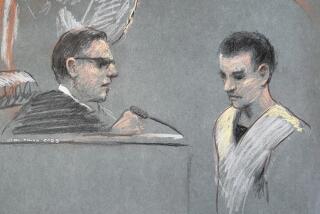More Indictments Due in Point Mugu Inquiry
- Share via
Two former managers at the Point Mugu Naval Air Weapons Station face indictment by mid-August in the government’s continuing investigation into a purchasing fraud scandal at the base, a prosecutor disclosed Monday in a Los Angeles federal courtroom.
Both managers--mid-level civilian supervisors who approved the purchase of industrial merchandise for the Navy base--were recently fired, a government source said.
Their terminations came amid a major overhaul at the base as a result of which purchases now receive “double scrutiny” by civilian and military personnel--instead of just civilian workers--”which will minimize an opportunity for this to happen again,” the source said.
Disclosure of an imminent new indictment by Assistant U. S. Atty. Patricia A. Beaman came during a sentencing hearing before U. S. District Judge William M. Byrne Jr.
As a result, Byrne delayed sentencing a former Ventura businessman and a Camarillo man, both of whom pleaded guilty in October to charges stemming from a 29-count indictment.
“I don’t know who’s the heavy player,” Byrne said when informed by Beaman that another indictment was imminent.
The fraud, perpetrated between 1983 and 1989, has cost the government about $1.5 million, investigators estimate.
None of the fraud allegations involved weapons or military hardware. Instead, the fraud scheme concerned kickbacks and bribes involving merchandise such as building or plumbing materials. The base pays for the merchandise when a supplier presents an invoice.
According to the indictment, there were fabrications of “bogus orders of merchandise” that were never delivered to the base.
One of the two mid-level managers facing indictment was characterized by Beaman as “the insider” who would call outside base vendors to set up the scam.
After the insider was promoted, another person took over his post in 1988 but still provided kickbacks to his predecessor, Beaman said. The second person also faces possible indictment, she said.
Another 10 people possibly connected with the investigation are still being questioned by government agents, Beaman said.
“There’s a great number of (suspects) out there,” she told the court.
Byrne then continued the sentencing hearing for Bill M. Frazier, 46, of Camarillo and Martin S. Anderson, 44, formerly of Ventura, who now resides in Castalia, Ohio.
Both were indicted by a federal grand jury last year and are charged by the government with having played key roles in the fraud.
Anderson pleaded guilty in October to conspiracy to defraud the government and tax fraud. He owned the now-defunct Anderson Industrial Supply of Oxnard, which had been doing business with the Navy base for about 20 years.
Frazier pleaded guilty in October to one count each of conspiracy, mail fraud and tax fraud. Frazier, who owned an industrial supply firm in Camarillo, was employed as a salesman by Anderson from 1983 until 1986, when he left to open his own business, Camarillo Tool & Supply.
A third defendant, Erwin H. Muller, 49, a Camarillo businessman, pleaded guilty in April to conspiracy to defraud the Navy base and tax fraud. He was given a suspended five-year prison sentence and ordered confined to his home for six months.
On Monday, Judge Byrne characterized the fraud as “a perfect finger-pointing case.”
Indeed, in asking for a lenient sentence for his client, Anderson’s attorney, Alan Rubin, told Byrne that “all the false billing started when Frazier came to Anderson Industrial Supply.”
Whatever the case, Byrne made clear that both Anderson and Frazier will spend time in prison.
The government is asking that Frazier, who Beaman said had cooperated with investigators, serve 21 months in prison on the mail fraud and tax fraud counts and that his sentence for conspiracy run concurrently.
But Beaman said she does not believe that Anderson has been telling the truth about the fraud, and she is pressing for 14 months’ prison time on his tax fraud count plus a minimum of three years for conspiracy to defraud the government.
Byrne put off the sentencing until he has a chance to assess the role of the “insider” who faces indictment. He said he wanted to know more about the person who, in effect, told the outside vendors, “if you want to deal with the government, you’ve got to pay bribes to us.”
More to Read
Sign up for Essential California
The most important California stories and recommendations in your inbox every morning.
You may occasionally receive promotional content from the Los Angeles Times.









